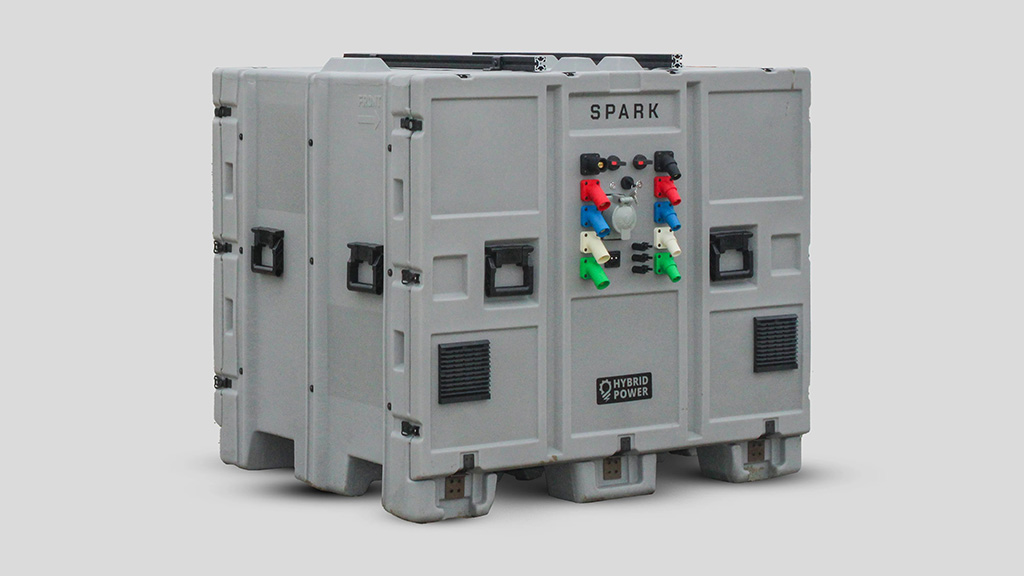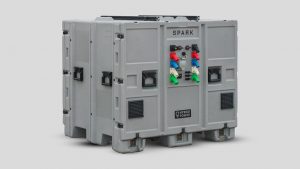’s Ottawa office is launching its first worksite hybrid battery power installation just in time for Zero Emissions Day Sept. 21.
The solar/battery power system comes with a smaller diesel generator as a backup. The pilot project is an alternative to the traditional diesel power sources generally used on jobsites when there is not access to the provincial power grid.
The pilot is being spearheaded by
He explained the Ottawa team began considering the idea of alternatives to diesel in the wake of EllisDon’s recent impact report, which reiterated the firm’s corporate commitment to be net-zero by 2050 with an interim milestone of a 42-per-cent reduction by 2030, which is a “big bite,” said Hyland.
The hybrid power solution was to be delivered to a new Ottawa project site today (Sept. 20), just in time for Zero Emissions Day.
EllisDon’s emissions profile showed 50 per cent came from diesel use, Hyland said.
The team was looking for a portable off-grid solution that has quick deployment, would have diesel reduction or elimination, battery storage, power generation, was durable and with low maintenance, Hyland said.
“In Ottawa, there was a lot of talk about, well, we’re not a city that’s so dense with highrise buildings,” said Hyland. “We have a lot of big sky available to us. Could we look at a solar option?”
Other temporary power solutions emerging in the marketplace include wind-powered generators, hydrogen fuel cells and natural gas generators. Hyland said the technology has improved a lot in the past five to 10 years and the decision was made to use solar for the pilot, with options open for the future.
EllisDon worked with the Ontario firm to derive its generation plan and will install the Batt Pack Spark 24kW system along with solar panels.
“We started kicking the tires of a few different companies around. There’s definitely a number of these vendors coming available because of the need to electrify,” said Hyland.
Should pay for itself
EllisDon was looking for a new project with no access to the grid to initiate the pilot. Hyland declined to identify the specific Ottawa project other than to say it is a large site.
Preliminary estimates are that the hybrid battery installation is expected to save up to 1,333 litres of diesel per month, a savings of $2,800 monthly, and 3,600 kilograms of carbon per month, compared to an equivalent diesel generator.
“These are the potential savings, but it’s going to vary based on the weather data that we have, what the load of the system is…because even the loads on the systems are variable,” Hyland explained.
“That’s one of the things we’re noticing when we have diesel generators onsite, we’re sizing it for almost the worst case, and they’re not running efficiently, where the battery will help increase that efficiency.”
Hyland said he believes the investment will pay for itself.
Every month the diesel savings will add up, and the unit will be reusable. He speculated EllisDon could get 10 years’ use out of the Spark system.
“This thing will pay off well before that, and we’ll see savings, not that it’s cost-neutral, but we’re expected to see savings at the end of this,” he said.
The team intends to carefully monitor usage and study and manage the data to be able to use the pilot as a business case.
Hyland said he is not aware of other specific pilot projects, but he assumes others in the industry are exploring alternative power installations as firms drive to lower emissions.
“Even outside of construction, I think there’s plenty of opportunity for these types of solutions going forward, with equipment deployment in remote areas,” he said.
Follow the author on X/Twitter @DonWall_DCN.










Recent Comments
comments for this post are closed